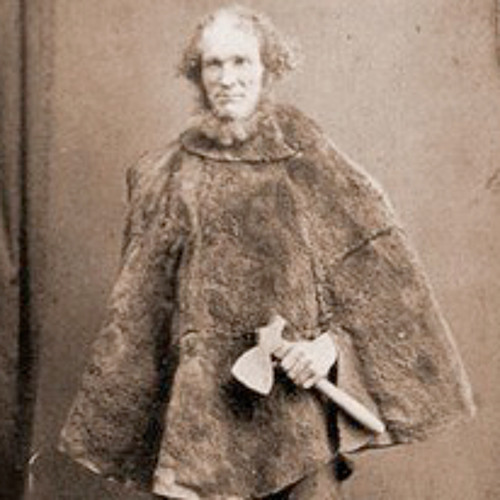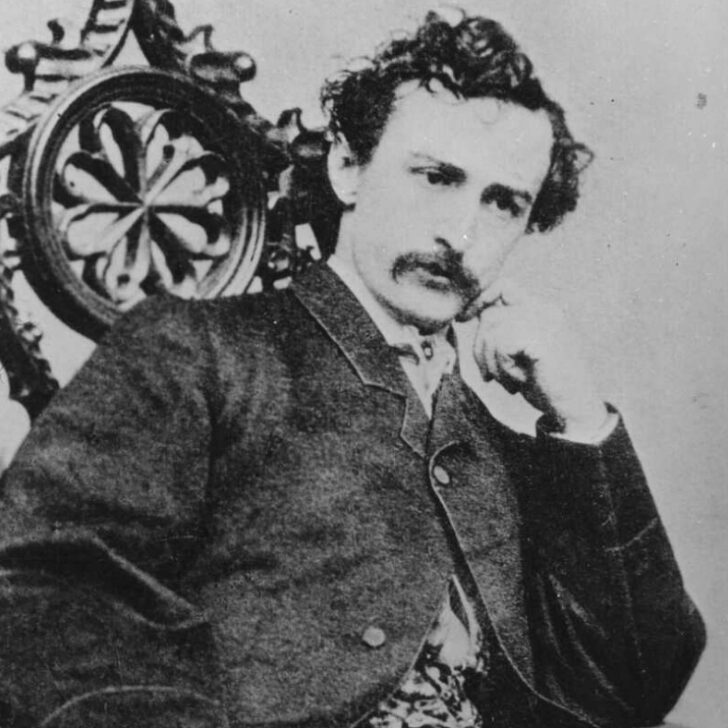Serial criminal Joseph Bolitho Johns is known more for his impressive—and persistent—prison escapes than his crimes.
Born in England in 1826, Joseph grew up to be a career criminal, thieving and robbing to get by.


Naturally, he was caught for his crimes and, in the end, exiled to Western Australia after his stints in English prisons didn’t prevent him from committing his petty crimes.
His offending would only escalate upon his arrival in Australia. His story, and how he became known as Moondyne Joe, is a lesser-known tale from the history archives but an intriguing one nonetheless.
Joseph Bolitho Johns Childhood And Early Years
Depending on your source, Joseph Bolitho Johns was born in either Cornwall or Wales in 1826. He was the youngest of three to parents Thomas Johns and Mary Bolitho.
He grew up in relative poverty and endured a tough childhood fraught with persistent sickness.
In particular, a bout of smallpox rendered the child poorly for a long while, and Joseph carried the scars it left to adulthood. He was described as being heavily “pockmarked” on his face due to the virus.
His father died when he was just six, meaning Joseph and his siblings had to get to work early. They were employed as copper miners, though the pay was paltry.
As he got older, Joseph quickly figured there were other ways to make money than mining or laboring: stealing. He went from a hard-working young boy to a petty thief adolescent, all in the name of survival.
When he was a young man, Joseph and a companion broke into a home intending to steal food. The teenagers were successful: they obtained three loaves of bread, one piece of bacon, several cheeses, and a shoulder of mutton, among other items.
It was 1848, and times were hard. Things were so bad that the time has retrospectively been called the “hungry forties” due to how difficult it was for poor families to survive. As such, theft was on the rise, but so was the punishment for the crime.
In March of that year, the thieves were tried for the crime and handed a seemingly disproportionate sentence of ten years of penal servitude.
It was later discovered that the judge who handed down the sentence had given others, with similar charges against them, mere months in jail. It seems, for whatever reason, he disliked Joseph and his co-conspirator.
After being bounced from prison to prison, including a stint in Dartmoor Prison in 1851, it was clear Joseph couldn’t behave himself. So, sometime in 1952, he was ordered to board the prison ship “Pyrenees” to serve his sentence in Australia.
On the ship, however, Joseph managed to refrain from carrying out any criminal acts. His excellent behavior on board saw him offered a “ticket of leave” upon arrival in Fremantle, where he had been scheduled to be locked up.
A ticket of leave was like a golden ticket for any criminal; it saw them released once the ship arrived at the destination. They would be free to work, have a family, and start life anew.
The only things they couldn’t do was leave the district without prior permission, carry guns, or board a ship.
Should the convict abide by these rules and be a “good citizen,” then they would be eligible for a conditional pardon, which would remove all the restrictions that had been placed on the individual.
The Spate Of Crimes
It seems that, for a while, this is what Joseph was working towards. He settled in a rugged, hard-living area in the Avon Valley, which the Aboriginal people named Moondyne.
Here, he earned his money honestly by doing handywork and returning lost horses and stock to their rightful owners, who all paid a reward for this service.
This way of living wouldn’t last too long, though. The criminal way of life would find Joseph Bolitho Johns once more.
In 1861, he caught an unbranded stallion, otherwise known as a brumby, and branded it. This was classed as horse stealing, and Joseph was swiftly arrested. He was locked up in the cells, and the horse was taken in as evidence.
Not willing to face finishing his initial ten-year stretch, the criminal broke free from the jail at some point through the night.

Not only that, but once again, he stole the horse. Before taking off with the brumby, he fitted it with a brand new bridle and saddle, which later turned out to belong to the magistrate.
He made his getaway but knew he had to get rid of any incriminating evidence if he were to be found not guilty of the crime. So, he killed the horse and cut off the brand he’d previously seared into its hide.
The horse was recovered, but the incriminating evidence was gone. So, when Joseph was eventually recaptured, he was only sentenced to three years behind bars, not ten.
He was released in February 1864 since his sentence was shortened again due to good behavior.
For a year or so, Joseph once again tried to live a “normal” life: he got a job, worked for his money, and lived simply.
Until, in 1865, he was found guilty of killing yet another animal, this time a steed, and was ordered to serve the full ten-year sentence in Fremantle Prison.
He would go on to escape three times in four months. In one of these instances, he was on the run for an entire month. Among the multiple successful escapes were numerous failed attempts.
One such incident saw him receive another six months imprisonment, which was added to his sentence for cutting the lock out of his cell door.
The third escape saw Joseph and a fellow convict breaking into the supplies store of one of his old enemies, James Everett.
The robbery killed two birds with one stone: it offered Joseph revenge against his foe, and it served to get him supplies for his planned trip to South Australia.
This is where his old friend was imprisoned, the fellow thief with whom he had stolen bread and cheese as a young man.
Joseph wouldn’t make it far on his journey to South Australia, though.
He was captured and was punished harshly for his persistent escapes and escape attempts. For these crimes and the robberies committed while on the run, he was sentenced to serve his remaining sentence plus five years of hard labor.
He was carted off to Fremantle prison, where he found an “escape-proof cell” waiting for him. It seems Joseph would take this as a challenge.
The 4′ x 7’ cell was fortified with solid timber planks fixed in place with metal studs. Not one but three sets of bars were on his tiny window, preventing him from prizing them open and somehow squeezing through.
Throwing him into the cell, Governor Hampton goaded him, telling the criminal he would pardon him if he ever managed to escape. It would be a comment Joseph would take literally.
His hard labor involved breaking stones in the prison yard. As the rocks piled up beside him as she hacked away at the large stones, it obscured the guard’s view of Joseph’s waist.
He used this opportunity to start using his sledgehammer on the limestone wall next to him. On the other side of the wall was freedom.
On March 7, 1867, the hole was big enough for him to escape through. He fled the prison, and his escape was covered in the Australian newspapers.
They referred to him as “Moondyne Joe,” a name that stuck with him over the years. It’s believed the name came from Joseph’s habit of hiding in Moondyne every time he escaped.
Upon learning of this most recent escape, Governor Hampton branded him a “scoundrel.”
Although authorities thought of Joseph as a menace, other settlers and natives saw him as a source of entertainment. They were awed by his ability to escape almost every jail sentence he’d been handed.
Because of his popularity, law enforcement believed that people would feed and house the criminal while he was on the run, thus helping him evade the police who were searching for him.
For three years, Joseph managed to lay low and elude the police. However, his luck would run out on February 25, 1869, when he broke into Houghton Winery to steal some bottles of wine.

By sheer misfortune, the store owner was one of the volunteers helping the police search for the missing felon. On the night of the robbery, the police were invited to the winery to sample some of the goods.
As Joseph was making his way out of the cellar with his stolen items in hand, he walked right into a group of policemen.
He was, once again, arrested. He had another four and a half years added to his sentence for the escape and the wine robbery.
Naturally, Joseph tried to escape again, though the attempts were fruitless. One such attempt was to recreate the key for his cell door, though his plan was rumbled before he could carry it out.
Two years after being captured and sick of the hard labor and the fortified cell he was confined in, he asked to see Governor Hampton to urge him to stay true to his word: that if he ever escaped, he would be pardoned.
A man is only as good as his word, as they say, and Governor Hampton stuck to his. Moondyne Joe was released as promised.
Freedom For Moondyne Joe
Though he was free, it seems criminal behavior was in Joseph’s blood. He would mostly stay on the straight and narrow, though he did find himself incarcerated a few times over the years for petty crimes.
Eight years after his release, he married Louisa Hearn, and for the first time in his life, Joseph would come as close as he ever would to “settling down.” The couple spent much time in Southern Cross, prospecting for gold in the nearby streams.
The pair explored much of Western Australia, though their time together would come to an abrupt end when Louisa died in 1893, aged just 40.
Unable to cope with life without his wife, Joseph’s mental health deteriorated rapidly. He became erratic and irrational, and his whole persona changed.
In the years after Louisa’s death, he was found to be mentally ill and placed in what was then called the Fremantle Lunatic Asylum. He was, in fact, suffering from dementia.
He passed away in August 1900, aged 74. His tombstone reads “rhyddid,” which means “freedom” or “liberty” in Welsh.
Sources
https://adb.anu.edu.au/biography/johns-joseph-bolitho-3859
https://fremantleprison.com.au/history-heritage/history/the-convict-era/characters/moondyne-joe













Leave a comment